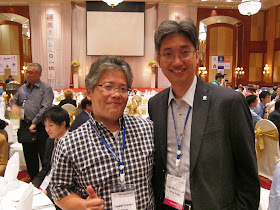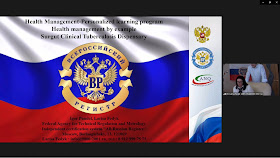The Asia Network for Quality (ANQ) Congress 2022 was performed
from 26th to 27th Oct 2022 in Beijing (Online mode). This year is
the 20th anniversary of ANQ. Parallel sessions and closing ceremony are
in day 2. HKSQ has two speakers in parallel session 14 and 15.
Parallel Session
I attended
the session 14 – Sustainability. Mr. Cheong Kah Leong (SQI) was session chair.
Dr. Kwok Pak Keung, Peter (HKSQ) was the first speaker
and his topic entitled “Towards the Realization of Corporate Sustainability – A
Componentizing Elements Model”. In the beginning, he briefed his aim for
providing guidance to micro and SME on the action and initiative for corporate
sustainability.
After comprehensive literature review, Componentizing
Model of Corporate Sustainability (CMCS) with 9 identified components was
proposed. Those components included Organization Sustainability Context, Sustainability
Commitment, Sustainability Orientation and Innovation, Economic/Ecology-Environmental
Social Emphasis, Integrated Risk Management, Value-based Action, Sustainability
Capacity Building, Ethical Compliance/Corporate Behavior, and Organization Compliance.
Finally, Dr. Peter Kwok concluded CMCS could help to understand where the
emphasis of their efforts is and what should be entered into the corporate
sustainability system.
The second speaker was Ms. Chisato Kajihara1 and her
topic named “Differences in the Understanding of Environmentally Conscious
Behavior between Companies and Consumers”. Firstly, she briefed the background and
research approach to us. She said this study aims to identify the gaps by
surveying consumers on their environmental awareness and actual behavior.
Finally, she showed some results from the survey to
answer her hypotheses for the gaps. Her future research would be focus on targeted
products and measures to mitigate these gaps.
The third speaker was Mr. Min Seo Park and his
presentation title was “The Effect of Board Composition and Characteristic of
Governance to Sustainability Reporting in the Korean Context”. Mr. Park built
hypothesis depending on literature review and empirically analyze firms to
reflect Korean context in sustainability report. He planned to develop
regression model after the study.
Mr. Igor Pundel (ARR) was the fourth speaker and his presentation
title named “Wastewater treatment of all types of generation by natural
biocenoses with pre-detoxification”. Firstly, he mentioned the roots of modern
water problems including wastewater toxicity, dissolved oxygen and CO2 in
water, anthropogenic effluent discharge, deposition of sewage sludge, etc.
Then Mr. Igor stated the before and after rehabilitation
that improve a lot on the environment.
Finally, he discussed with and without biological
treatment facilities, as well as, proposed their Fractal Drainage System. Until
now, there had ten cities employed in Russia.
The fifth speaker was Ms. Isuja Aryal (NATCM) and her
topic entitled “Sustainable development through application of different
international standards and challenges in its implementation- Case study in Tea
manufacturing units in Nepal”. She visited different tea manufacturers and
employed GMP for their sustainable tea manufacturing.
The last speaker was Dr. Roy Rimington (SQI) and his presentation
named “Integration of Enterprise Risk Management (ERM) in Strategic Planning”.
Firstly, he mentioned current challenges including complex world, climate
change, supply-chain disruptions, health conditions, rapid changes in
technology and the digital environment, etc.
Finally, Dr. Roy Rimington proposed framework and
roadmap of integration of enterprise risk management under the suggested model.
Before completed this session, we took a group photo
for memory.
I had also attended the session 15 – Sustainability &
Ecosystem for HKSQ participated speaker. This session is chaired by Mr. Zhao
Yicheng (CAQ), I capture their group photo for memory.
Dr. Hely Law Ping Keung (HKSQ) was the fourth speaker
in this session and his topic named “Impact of Occupational Stress on Work
Performance of Civil Engineering Project Managers”. His research aimed to
identify the sources of occupational stress that significantly affect civil
engineering project managers’ work performance.
Dr. Hely Law proposed a conceptual framework and found
that poor relationship quality had a negative correlation with task performance.
Finally, he concluded that work overload, role conflict/ambiguity, poor
organizational policies, low autonomy and poor physical environments were the
major factors for low job performance and more counterproductive behavior.
Keynote Speeches
After
parallel sessions completed, ANQ closing ceremony started. In the first part of
ceremony, there were three keynote speeches.
The first keynote speaker was Ms. Wang Lin (Vice
Chairperson of Organizing Committee; CAQ) and her topic entitled “Research on
Brand Evaluation Model Based on Total Brand Management Theory”. In the beginning,
Ms. Wang briefed different brand activities of CAQ.
Then Ms. Wang mentioned three dimensions for Chinese
corporate brand environment and opportunities including Corporate Brand
Building, Digital Technology Opportunities and Policy Environment. And then she
described the research background in three ways.
After that she proposed Total Brand Management (TBM) approach
including three characteristics and they were all staff, overall process and
all-dimensional.
Lastly, Mr. Wang promoted the Brand Value Evaluation Model
which was based on ecological perspective.
The second keynote speaker was Mr. Li Gaoshuai (Deputy
Secretary General of CAQ) and his presentation topic named “Evaluation of
Automobile Satisfaction in Southeast Asia”. Firstly, Mr. Li briefed the background
of automobile market and satisfaction trend from past 20 years.
And then Mr. Li briefed their research system of Southeast
Asia automobile service as well as Southeast Asia Customer Satisfaction Index
(SEACSI).
After the survey, the SEACSI evaluation in 2021 was analyzed
and factors relationship were obtained. Finally, he summarized that the
research would help the auto brands of various countries better enter the Southeast
Asia market. Lastly, he suggested the future research would focus on young users’
needs and new energy needs.
Prof. Shu Yamada (JSQC) was the last keynote speaker and his
presentation entitled “ANQ Way: Guidance for Sustainable Growth”. Firstly,
Prof. Shu reviewed his first involvement of ANQ in 2002.
After that Prof. Shu briefed the progress on QC and QM
in the past several years. He also pointed out current challenges including
unobvious customers and society satisfaction.
Lastly, Prof. Shu employed school education as example
to explain how complex to identify the stakeholders. He proposed solution for the
challenge such as visualizing the society in terms of product, service,
information and financial value; as well as, digital transformation employed to
collect appropriate data. “ANQ way is completely matching the current challenges
as guidance for sustainable growth” is the conclusion by Prof. Shu at the end.
Closing Ceremony
Prof.
Tang Xiaoqing (Technical Chair, 20th ANQ Congress 2022) chaired the session of “Full Paper Review Summary
& Best Paper Announcement”.
ANQ 2022 had totally 127 papers from member organizations.
Then the best paper winners list was showed and there
were 21 papers awarded (~17%).
ARE-QP Award Winner Announcement performed by Mr. G.E.
Tan (Chairman of ARE-QP)
After that some short videos for “Message of Hope and
Words of Encouragement” from ANQ Country/Region Representatives are played including
ARR, BSTQM, CSQ, ISQ, HKSQ, JQCS, SQI, VQAH, NQPCN and PSQ.
Lastly, Dr. Duan Yonggang (CAQ Secretary-General) gave
closing speech and he expected we all would meet face to face in ANQ 2023.
ANQ Chairman handover from Prof. Wan Seon Shin to Prof.
Shu Yamada. Prof. Shin appreciated all members’ support his work during Covid-19
in past two years. And Prof. Shu would take up this challenge and continue ANQ
way in the future.
Last but not least, CAQ invited all participants to take
a group photo online.







































































